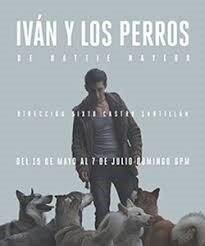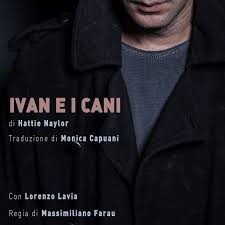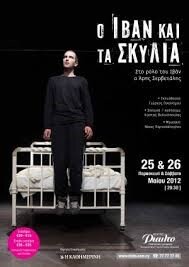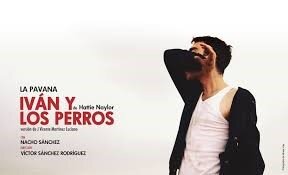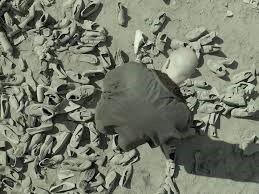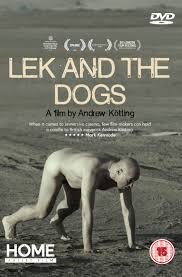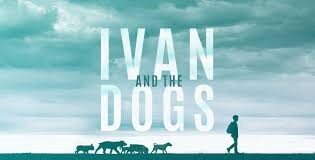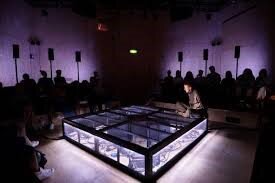A Good Idea at the Time
Ivan and the Dogs
By Hattie Naylor - Senior Lecturer BA Screenwriting and Film at Sheffield Hallam University
The story is as simple as this: I first came across the story of Ivan Mishikov in Michael Newton’s book Savage Boys and Wild Girls, A History of Feral Children (Picador 2002).
Ivan Mishikov was found on the streets of Moscow in 1998, aged six. He had been living on the streets of the city with a pack of wild dogs for two years, surviving the bitter winters in Russia by snuggling up to the dogs at night. He begged for food for them and they, in turn, protected him. It took three attempts for the Militia to capture the boy, as the dogs attacked. They finally trapped the dogs with food and shot them. The boy was then seized and placed in an orphanage. Later he was fostered.
This is all I had.
But the moment I read this story I knew it was a fabulous, tragic, hopeful, contemporary, relevant, life expanding tale. I already knew a little about Russian history. 1998 was the year in which the Soviet System collapsed as the country rushed arguably too quickly from Communism to a Capitalist system. People lost their savings overnight and there was a near bloody coup on the streets of Moscow. What happen after was a total collapse of the system with little or no food and little or no money or employment. It is likely that Ivan was amongst the thousands of children that either ran away or were abandoned at that time. It was very clear to me that this story was primarily concerned with what happens when society breaks down; it is always the most vulnerable, the old, the weak, the poor, the disabled, the children that suffer most in such periods. The story could also be used as an allegory of these two political systems. It is also a story that concerns our complex relationship with animals. It is also a story that concerns abandonment and our relationships with are guardians and it also a story that concerns the wild in an urban environment. It is an astonishingly rich tale. A tale that matters, that has themes, meaning, breath and ultimately light, in that the dogs where clearly the best family that Ivan had ever known, utterly loyal, and devoted to the him and their pack.
If you ever find a story like this – then you cling onto it until someone finally commissions you to create it.
So this is what happened next.
It was commissioned in maybe 2005 by The Unicorn Theatre, (this is the National Theatre for Children), and Trestle Theatre. This financing gave me time to create the first draft and, very importantly for a world I do not know, begin extensive research. The two companies also paid for a research trip to Moscow. This proved invaluable: we employed two ‘fixers’ one Russian Fixer, and another one English Fixer, working as an intern for the BBC in Moscow. They both had very different
and informed opinions on Russia in that period. The Fixers took me into factories, into vast endless tower blocks in impoverished sections of the city, they took me to see communities of abandoned dogs that were still living on the streets, and they took me to two orphanages. There is no substitute for this level of research if you are planning to write a play set in another country and in a different time period.
BUT the more I researched I began to question whether this story was appropriate for children. The cruelty, negligence, and bereavement that Ivan was exposed too, was difficult to stay true to within the drama. The necessity to reduce particularly the violence of the play began to undermine its quality. It was also commissioned as a musical and again, I found this more and more problematic. Then the remit of both the commissioning companies began to change due to the companies themselves.
Finally, after three drafts, both companies decided against full production. I cried literally for a day. This was firstly, because I was unused to the knock backs the industry gives you, secondly, because I had sunk my soul into the work (which is how you write any play) and thirdly because of the sheer frustration of knowing in my heart that this story was an exceptional story (and by this I don’t mean the quality of what I had written) I mean Ivan’s story itself.
Then again, perhaps, fourthly, I knew they were right. It had been commissioned for children and was not a children’s story, not if I wanted to stay true to what Ivan had experienced. And this is another thought if you come across an exceptional story, for it to have quality you need to stay true to it; true to the meaning of what the story is telling you about life and the human condition.
I continued to try and get it commissioned. It then took three attempts, (that’s three years) despite my long track record with BBC Radio Drama, to persuade BBC Radio 4 to commission me. There are many reasons why you do not get an idea through the commissioning round, sometimes it is because there are too many similar ideas, sometimes it is because you have written something tonally inappropriate in the pitch document or sometimes it is because they have too many ideas set in one country, but I carried on putting it in because I was convinced by the story itself.
It was commissioned in 2008, produced and broadcast in 2009 and won the Tinniswood Award which is the most prestigious scriptwriting award that BBC Radio run, in 2010.
By then I had also re-written (again) for Theatre.
I went to a workshop run by the Literary Manager of the Soho Theatre, a woman that I did not know, (it is always better to meet the people that you want to produce your scripts) and placed the script in her hand at the end of the workshop.
With the support of her, Soho Theatre then commissioned the play as a joint venture with the Theatre company ATC.
It ran for four weeks, in the main space, had good notices, not exceptional, but good. Word of mouth was better, and by the end of the run we were selling out. It was also published by Methuen.
The film maker Andrew Kötting came to see it whilst it was on at the theatre.
And I suppose I thought that was that.
About seven months later my agents were contacted by Soho Theatre and we were told that it had been nominated for an Olivier Award, in the category of Outstanding Contribution to Theatre. It was a wonderful moment.
We did not win but it was a great a super glamourous night and then party in the Waldorf Hotel. See below: Olivier Awards 2010.
Hattie Naylor at the 2010 Olivier Awards and Nominated for Outstanding Contribution to Theatre
And again, I suppose, I thought that was that, especially as we had not won.
But then I was contacted by a Brazilian Director, who asked if I would like to take part in an English Cultural Festival in São Paulo. This was the first foreign production, this production has since picked up a couple of awards in Brazil and toured the country three times.
Since then there have been new productions In Holland, Georgia (Tbilisi), Spain, Greece, France, Argentina, Mexico, New York and more recently Italy.
And again I thought that might be about it now.
But then Andrew Kötting contacted me and asked if we could turn the play into a film. Renamed LEK AND THE DOGS and very much Andrew’s film, it is a different article but still one I am very proud to have been part of. It was Produced by Salon Pictures with support from the BFI and HOME. The film was part of the 2017 Official Selection in the London Film Festival, and went to further international festivals before general release in 2018. It was amongst Mark Kemode’s films of the year.
And again I thought that might be finally it.
But in 2019 I was contacted by the Young Vic in London, which is amongst the most prestigious venues for new work in the UK, to ask if they could mount a new production, for their Genesis programme. It showcased in July last year.
Good stories, tragic, compelling, concerned with injustice, political, relevant, sad and funny – are hard to find – if you ever find one or create one and are certain if its quality – well the above might give you some idea about what to do, and what your idea might become.






